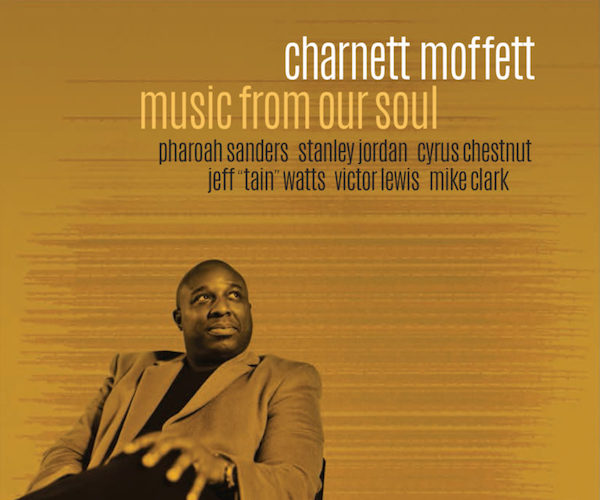Jazz CD Review: “Charnett Moffett — Music From Our Soul”
Large parts, if not all, of this well played, eclectic disc should appeal to various tastes in modern improvised music.
Charnett Moffett: Music From Our Soul (Motema Music)

By Steve Feeney
Born into a musical family, bassist Charnett Moffett showed up on the big time jazz scene about 30 years ago. Early gigs with everyone from Art Blakey to Ornette Coleman revealed that he had the confidence to assert himself in a variety of musical contexts. With his new recording Music From Our Soul, Moffett (at the age of 49) has reached a point where he’s ready for an album that he hopes “represents the history of my career.”
Largely full of Moffett originals, the disc features a mix of genres — from jazz and fusion to what lies between and beyond. But three cuts featuring the legendary tenor saxophonist Pharoah Sanders are what make it, for me, a particularly welcome addition to the list of new releases this year. Program your player accordingly and these three tunes make for a sublime fourteen-plus minute suite.
A friend of his father, drummer Charles Moffett, Sanders has worked with Charnett off and on over the years.The now 76 year-old saxophonist proves that he can still blow with the kind of textured expressiveness that marked his solo work in the late 1960s and early 70s — the period immediately following his seminal collaborations with John Coltrane. Moffett places Sanders in a small but expansive combo featuring Stanley Jordan, doubling on guitar and keyboards, Jeff “Tain” Watts on drums, and the leader on electric bass.
The title cut feels like a jam joined in progress, one that’s already moving into reflective territory but also suggestions of something interesting yet to come. Jordan, whom I haven’t checked in on for some time, is the revelation here. Chopping out electric guitar chords before switching to piano half-way through, the young/veteran provides plenty of emergent edginess though sophisticated elaborations at the keyboard.
Sanders evokes vast soundscapes that are filled with the kind of strength and yearning that he created in the weird, transitional period that followed the musical advances of the sixties. His message ranges from the spiritual to the earthy; Moffett’s reverb-heavy reflections float above Jordan’s lines until Sanders offers one last plea for hope.
“We Are Here To Play,” though found six cuts further into the disc, picks up where the first piece with Sanders left off. The tenor blows with even more bite with Jordan divving up the tempo.The saxophonist then launches into an epiphany via a signature textured blast.
Skipping ahead (again) to cut thirteen, “Freedom Swing” begins in an incantatory vein before quickly switching over into a bass walk by way of polyrhythmic momentum from Watts. But it’s only a short time before Sanders really lets loose, summoning up some classic free jazz expressiveness and augmenting it with an ecstatic vocal holler. A hint of the theme from “A Love Supreme” emerges with a hammered guitar solo by Jordan as the piece ends (too soon).
Among the remaining pieces on the disc, pianist Cyrus Chestnut steps out on “Come and Play,” a hard charging number that employs drummer Victor Lewis. Moffett switches to acoustic (with electronic enhancements) bass for both arco and pizzicato flourishes.
The above trio also nods to tradition with an exhilarating take on Duke Ellington’s “Mood Indigo.” Chestnut articulates a smart and soulful turn that swings and cascades into several thoughtful brushwork interludes from Lewis. Miles Davis’s classic “So What” rides on Mike Clark’s timekeeping and a nice inside-out guitar solo that harkens back to Jordan’s early work.
A few tracks are less satisfying, though they are not total washouts. “Mediterranean” lets Jordan loose for a distorted solo which will remind some of why the jazz/rock fusion genre succumbed to a chilly virtuosity after its initial, gritty promise. The electronics on “Just Need Love” feel dated and the leader’s electric bass on “Sound World Suite” begins to grate — though powerhouse Watts nearly saves the day.
Large parts, if not all, of this well played, eclectic disc should appeal to various tastes in modern improvised music. Moffett’s capacious soul contains a little bit of everything, from swing to bop to free jazz, with elements of world music and rock fusion tossed in for good measure.
Steve Feeney is a Maine native and attended schools in Maine, New Hampshire and Massachusetts. He has a Master of Arts Degree in American and New England Studies from the University of Southern Maine. He began reviewing music on a freelance basis for the Portland Press Herald/Maine Sunday Telegram in 1995. He was later asked to also review theater and dance. Recently, he has added BroadwayWorld.com as an outlet and is pleased to now contribute to Arts Fuse.
Tagged: Charnett Moffett, Music From Our Soul, Pharoah Sanders
